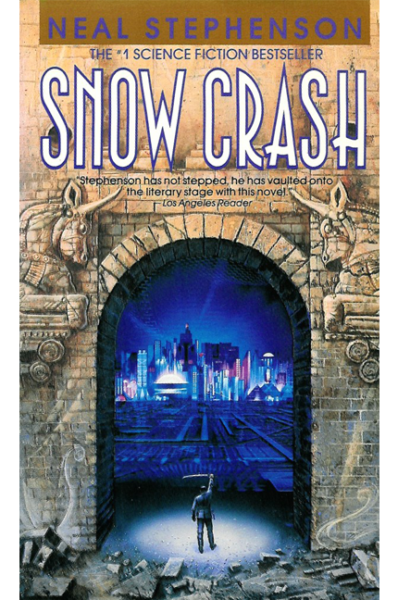In The Line Matt Gurney wonders what Zuckerberg is up to with the corporate re-naming:
Mark Zuckerberg, Facebook’s founder, chairman and CEO, has unveiled the newly rebranded company’s plans for the “Metaverse” — a combination of online environments that can be experienced in augmented and virtual reality. (The company’s new name, Meta Inc., reflects the new focus, but the major brands the company owns, including Facebook itself, will retain their current names under the now-renamed parent company.)
We can’t ignore the fact that Facebook is rolling out its bold plan at a moment when the company is on the receiving end of much negative attention over its business practices and corporate values, if any. Facebook is as much a global supervillain as a company, or at least the overall coverage would suggest as much. No, we definitely can’t ignore that, and we won’t — look for a specific analysis of that part of the whole puzzle in this week’s full version of the The Line‘s dispatch feature later today.
But for this column, just for now, let’s briefly set aside Facebook’s major political and cultural problems, and actually try to assess Metaverse on its own merits. What the hell is the company trying to do here, and will anyone go for it?
The what of Metaverse is intriguing. Zuckerberg announced the concept in a promotional video, but that’s mostly marketing. The Guardian tried to concisely sum up what is being proposed, and I probably won’t do better, so let’s just crib their summary:
The metaverse is where the physical and digital worlds come together. It is a space where digital representations of people – avatars – interact at work and play, meeting in their office, going to concerts and even trying on clothes.
At the centre of this universe will be virtual reality, a digital world that you can already enter via Facebook’s Oculus VR headsets. It will also include augmented reality, a sort of step back from VR where elements of the digital world are layered on top of reality – think Pokémon Go or Facebook’s recent smart glasses tie-up with Ray-Ban.
Virtual reality isn’t a new technology — I first tinkered around with a VR headset as a child probably 25 or 30 years ago at a downtown Toronto convention centre. It was incredibly rudimentary, but the core concept has basically stayed the same: a user puts on a virtual reality headset that puts a screen (or two separate ones) before their eyes, and those screens provide visual stimuli that, when combined with audio through a headset or earbuds, can create a very convincing simulation of … basically anything. There are a series of virtual reality video gaming systems on the market today; I own one of the lower-capability versions, a PlayStation VR, running off a Playstation 4 console. Though one of the less powerful modern VR systems, it’s still surprisingly capable of completely tricking your brain. My wife and I once spent an amusing evening doing a virtual rollercoaster ride, and even sitting in a chair in my basement, you’d swear you could feel the motion of the car going up and down the tracks.
All the bafflegab about a “metaverse”? Wes Fenlon believes it’s all bullshit:
We have Neal Stephenson’s 1992 novel Snow Crash to thank for popularizing avatars as our digital personas, from early internet message boards to full-body VRChat. We also have Snow Crash to blame for the absolute hell we find ourselves in today, as every tech billionaire on the planet slobber all over themselves as they declare the metaverse — the next phase of human culture!! — is within reach. Games, NFTs, crypto, VR, AR, the blockchain, they’re all wrapped up in this idea of a virtually-integrated society in which our Fortnite costumes will carry over to our Onlyfans accounts and we will never, ever have to log off.
The absurdity of it makes me want to scream, or maybe die, or maybe just spoon out the part of my brain that knows what an NFT is. But there’s one thing that keeps me going:
The absolute gleeful, cackling, deep-in-my-bones certainty that it’s all complete bullshit.
If you also know deep in your heart that the metaverse is a big fat steaming load of billionaire nerd pabulum, I hope reading these words provides you with a wave of vindicating comfort. You’re not crazy. I know it can feel like that when the people peddling these things seem so convinced that they’re the future, like they know something you don’t. Don’t fall for it. Watching people spend $69 million in fake money to buy a JPEG should make you feel like you’re living in an age of unparalleled nonsense.
That feeling isn’t going to go away. For the next decade we’ll all be asking ourselves if the whole world’s gone mad at least once a week. But the good news is that the metaverse and the tech industry’s very expensive obsession with trying to make it a reality will be a schadenfreude generator the likes of which we’ve never seen before.
We will all become the living embodiments of the one true expression of being online in the 21st century:
The metaverse is bullshit because it already exists, and it’s called the internet
When Epic’s Tim Sweeney and Facebook’s Mark Zuckerberg talk about the metaverse, they’re primarily drawing from the foundational visions of cyberspace created by science fiction authors like William Gibson and Neal Stephenson. Their books in the ’80s and early ’90s looked at what computers were capable of at the time and imagined them decades in the future, just abstract enough to let our imaginations run.
Here’s Gibson’s description of cyberspace in Neuromancer (1984):
A consensual hallucination experienced daily by billions of legitimate operators, in every nation… A graphic representation of data abstracted from the banks of every computer in the human system. Unthinkable complexity. Lines of light ranged in the nonspace of the mind, clusters and constellations of data. Like city lights, receding.
And here’s a snippet of Stephenson’s description of the metaverse in Snow Crash (1992):
Your avatar can look any way you want it to, up to the limitations of your equipment. If you’re ugly, you can make your avatar beautiful. If you’ve just gotten out of bed, your avatar can still be wearing beautiful clothes and professionally applied makeup. You can look like a gorilla or a dragon or a giant talking penis in the Metaverse. Spend five minutes walking down the Street and you will see all of these.
Both novels were prescient and profoundly influential. Alongside movies like Tron, they shaped ’80s and ’90s depictions of what it would look like to be inside a computer, from rudimentary early VR to movies like The Matrix. In 2012, Michael Abrash — who has worked at Microsoft, id Software, Valve, and Oculus — wrote that his game development career “all started with Snow Crash.”





